The Lovecraftian Poe
Perspectives on Edgar Allan Poe
General Editor: Barbara Cantalupo,
Pennsylvania State University, Lehigh Valley
The Perspectives on Edgar Allan Poe series includes books on new approaches to Edgar A. Poe, his work and influence; all perspectivestheoretical, historical, biographical, gender studies, source studies, cultural studies, global studies, etc.are invited.
Titles in This Series
The Lovecraftian Poe: Essays on Influence, Reception, Interpretation, and
Transformation, edited by Sean Moreland (2017) Translated Poe, edited by Emron Esplin and Margarida Vale de Gato (2014) Deciphering Poe: Subtexts, Contexts, Subversive Meanings, edited by Alexandra Urakova (2013) Poes Pervasive Influence, edited by Barbara Cantalupo (2012)
http://inpress.sites.lehigh.edu/
The Lovecraftian Poe
Essays on Influence, Reception,
Interpretation, and Transformation
Edited by Sean Moreland
LEHIGH UNIVERSITY PRESS
Bethlehem
Published by Lehigh University Press
Copublished by The Rowman & Littlefield Publishing Group, Inc.
4501 Forbes Boulevard, Suite 200, Lanham, Maryland 20706
www.rowman.com
Unit A, Whitacre Mews, 26-34 Stannary Street, London SE11 4AB
Copyright 2017 by Rowman & Littlefield
All rights reserved. No part of this book may be reproduced in any form or by any electronic or mechanical means, including information storage and retrieval systems, without written permission from the publisher, except by a reviewer who may quote passages in a review.
British Library Cataloguing in Publication Information Available
Library of Congress Cataloging-in-Publication Data
Names: Moreland, Sean, 1975-editor.
Title: The Lovecraftian Poe : essays on influence, reception, interpretation, and transformation / edited by Sean Moreland.
Description: Bethlehem : Lehigh University Press, 2017. | Series: Perspectives on Edgar Allan Poe | Includes bibliographical references and index.
Identifiers: LCCN 2017007455 (print) | LCCN 2017008474 (ebook) | ISBN 9781611462401 (cloth : alk. paper) | ISBN 9781611462418 (Electronic) Subjects: LCSH: Poe, Edgar Allan, 1809-1849--Criticism and interpretation. | Poe, Edgar Allan, 1809-1849--Influence. | Lovecraft, H. P. (Howard Phillips), 1890-1937--Criticism and interpretation. | Lovecraft, H. P. (Howard Phillips), 1890-1937--Influence. | Horror tales, American--History and criticism.
Classification: LCC PS2638 .L68 2017 (print) | LCC PS2638 (ebook) | DDC 818/.309--dc23
LC record available at https://lccn.loc.gov/2017007455
 TM The paper used in this publication meets the minimum requirements of American National Standard for Information Sciences Permanence of Paper for Printed Library Materials, ANSI/NISO Z39.48-1992.
TM The paper used in this publication meets the minimum requirements of American National Standard for Information Sciences Permanence of Paper for Printed Library Materials, ANSI/NISO Z39.48-1992.
Printed in the United States of America
Acknowledgments
I would like to thank each of the contributing authors for their hard work and insightful contributions to this volume. Both S. T. Joshi and Perspectives on Poe series editor Barbara Cantalupo deserve special thanks for their advice and support of this project as it slowly came together. Thanks go to Jeffrey Savoye and John Glover for their research assistance, Miles Tittle for sharing his library, Bob Derrico for his editorial comments, and John Langan and Michael Cisco for insightful conversations that did much to spur this undertaking.
Finally, I would like to thank my wife Madeleine, who is unceasingly inspiring and whose love and support keeps me, haunted palace that I am, from tumbling into a dank tarn.
Sean Moreland
Foreword
S. T. Joshi
Poe and Lovecraft
Edgar Allan Poe (18091849) and H. P. Lovecraft (18901937) are the two leading writers of weird or supernatural fiction in American literature and perhaps in all literature. Both emerged at critical junctures in the history of the genre. Poes earliest writings in the 1830s were published during the waning stages of the gothic movement, initiated when Horace Walpole wrote The Castle of Otranto (1764), and inspired legions of imitators and successors, including Ann Radcliffe, Matthew Gregory Lewis, Charles Robert Maturin, and Mary Shelley. Poe either discarded or radically refashioned the cumbersome dramatic paraphernalia (as Lovecraft called it) of the gothic novel and focused intensely on the psychology of terror. He also sensed that fear is best conveyed in short compass and all but invented the short story as a literary mode, focusing on the unity of effect and emphasizing the importance of every episode, every paragraph, even every word for the storys dnouement.
Lovecraft, beginning his career almost seventy years after Poes death and after weird fiction had definitively established itself as a viable genre in the work of such writers as J. Sheridan Le Fanu, Ambrose Bierce, Arthur Machen, Lord Dunsany, Algernon Blackwood, M. R. James, and many others, came to the realization that weird fiction must strike a new path away from the already stale vampires, werewolves, and ghosts that had populated the field for generations. Contemporary findings in scienceespecially physics, biology, chemistry, and anthropologyhad rendered many of these tropes so implausible that, in Lovecrafts view, they had become unusable in serious literature. Accordingly, Lovecraft felt that only the boundless universethe nature and extent of which had barely begun to be charted by the human intellectcontained sufficient reservoirs of mystery that it could serve as the aesthetic foundation of a weird tale. In the course of his brief literary career, Lovecraft definitively established the tale of cosmic horror as a central component of the weird tale, and it remains his signature contribution to literature.
Poe and Lovecraft share a number of common features, some superficial and some much more profound. Both their careers lasted less than two decades; both produced a relatively slim body of fiction, confined almost entirely to the short story; and both devoted much time to essays and criticism, and in their essays and reviews they laid down important principles for the kind of literature they wished to write. In their personalities, they tended to be solitary, withdrawn, and not entirely comfortable with women; both claimed extensive but largely self-taught learning; and poverty dogged both their lives, manifestly contributing to their early deaths. Perhaps as a result of their distinctive personalities as well as the compelling nature of their literary work, both have become recognizable icons with appeal for a wide array of readers throughout the world.
Lovecraft had a deep and abiding respect for Poe, referring to him famously as his God of Fiction. As late as 1935, Lovecraft was admitting the Poe influence, although, interestingly enough, he denied a correspondents assertions that his prose style was exclusively modeled on Poes. In commenting on a story by Richard F. Searight that some had felt was written in Lovecrafts idiom, Lovecraft stated,
I cant see this in any marked degree. Rather would I say that you have simply chosen the same general cast of language which I preferbut which hundreds of others, long before I was born, have preferred. Many think I have derived this style exclusively from Poewhich (despite the strong influence of Poe on me) is another typical mistake of uninformed modernism. This style is no especial attribute of Poe, but is simply the major traditional way of handling English narrative prose. If I picked it up through any especial influence, that influence is probably the practice of the 18th century rather than Poe.

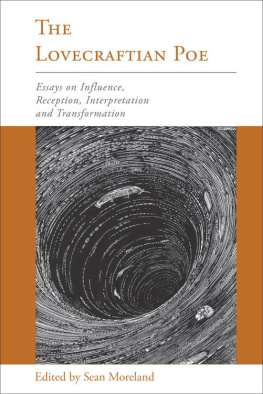
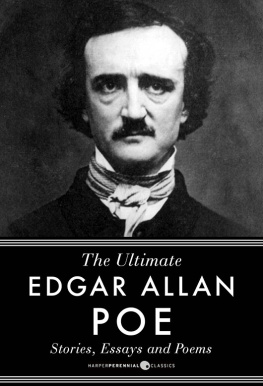
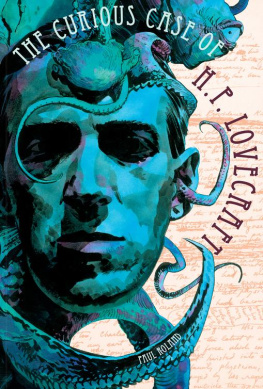

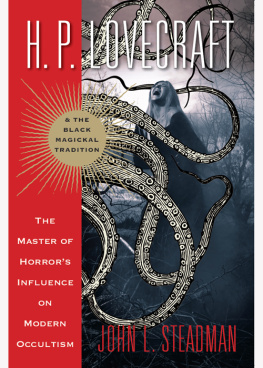
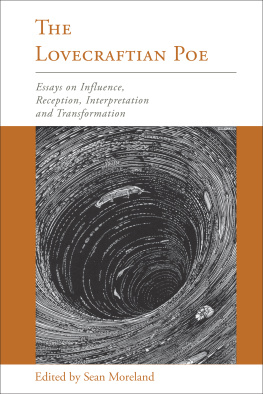
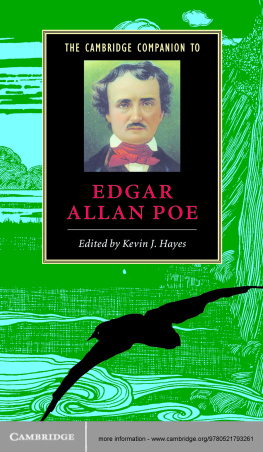

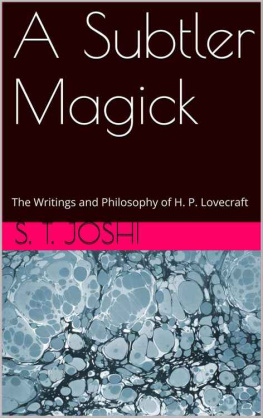
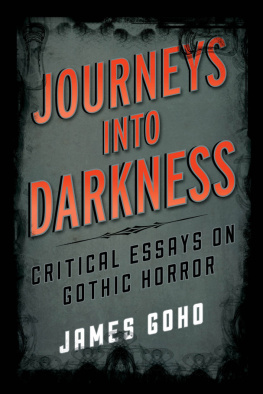
 TM The paper used in this publication meets the minimum requirements of American National Standard for Information Sciences Permanence of Paper for Printed Library Materials, ANSI/NISO Z39.48-1992.
TM The paper used in this publication meets the minimum requirements of American National Standard for Information Sciences Permanence of Paper for Printed Library Materials, ANSI/NISO Z39.48-1992.